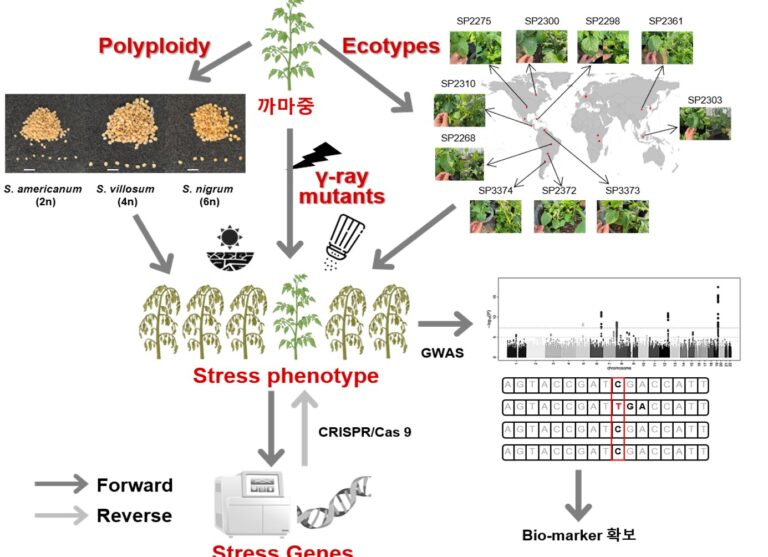Environmental Stress Adaptation in Solanaceous Crops: The Case of Black Nightshade (Solanum nigrum)

Black nightshade (Solanum nigrum) is a wild Solanaceous plant with remarkable adaptability to extreme environmental conditions, making it an excellent model for studying abiotic stress responses. Unlike traditional model plants such as Arabidopsis thaliana, black nightshade exhibits high tolerance to salinity, drought, and other environmental stresses, yet its molecular adaptation mechanisms remain largely unknown. This research aims to identify key stress-responsive genes and elucidate the genetic and physiological mechanisms that enable black nightshade to thrive in harsh environments. By leveraging forward and reverse genetics approaches, including gamma-ray-induced mutant screening, genome-wide association studies (GWAS), and CRISPR-based gene editing, we aim to uncover the regulatory networks underlying stress resistance in this species.
A major focus of this study is understanding the role of ploidy levels (diploid, tetraploid, and hexaploid) in stress adaptation. By comparing stress responses across different ploidy levels, we investigate how gene dosage effects and genome plasticity contribute to enhanced resilience. Additionally, transcriptomic and metabolomic analyses are being conducted to identify key regulators of salt and drought stress tolerance, particularly those involved in osmotic adjustment, ion homeostasis, and antioxidant defense mechanisms. Using RNA-seq, proteomics, and physiological assays, we aim to dissect the complex interactions between genetic variation and stress responses in black nightshade, providing a deeper understanding of its natural resilience.
Ultimately, this research aims to translate findings from black nightshade to economically important Solanaceous crops, such as tomato, pepper, and eggplant, to develop climate-resilient crop varieties. By identifying and validating stress-tolerant genes, we seek to enhance crop productivity and sustainability in the face of global climate change. Furthermore, this study provides a foundation for advanced breeding strategies, integrating molecular genetics, genome editing, and bioinformatics to improve stress resistance in Solanaceous crops. The insights gained from black nightshade will contribute to sustainable agriculture by reducing reliance on chemical fertilizers and improving plant adaptation to fluctuating environmental conditions.
